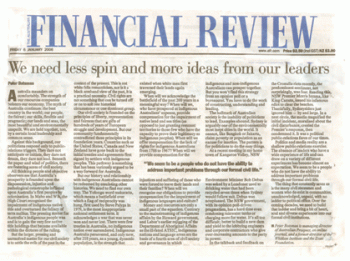Opinion Editorial Financial Review 6 Jan 2006

Australia meanders on comfortably. The continued strength of our resources companies bolsters our economy. The myth of Australiacontinues: the best country in the world; our people, the fairest; our skills, flexible and pragmatic; our lands and seas, the most beautiful and environmentally unspoilt. We are held together too I think by a certain local leadership and common sense.
Within this milieu our politicians respond only to public relations triggers, they dare not anticipate or initiate, they dare not dream, they dare not lead. Beneath the paper and wind of politics, there are festering sores of civil society.
All thinking people and objective observers see that Australia’s prosperity is founded upon the dispossession, injustice and pathological catastrophe inflicted uponAustralia’s first peoples by colonisation. With Mabo and Wik, the High Court recognised “the impairment” of Indigenous Native Title and over-turned the fallacy ofterra nullius. The pressing matter for Australia’s Indigenous people was and is to gain the very few native title holdings that became available within the dictates of the ruling.
But the larger, pressing and unresolved matter for our civil society is to resolve the evils of the past in the context of the present. This is not white fella romanticism, nor is it ablack arm band view of the past, it is a practical necessity. Civil rights are not something that can be turned off or on to suit one historical circumstance or one dominant group.
Our civil society is founded on the principles of liberty, representation and fairness that are gifts of hundreds of years of European struggle and development. But our community fundamentally contradicted these principles in its foundation years. Countries like the United States, Canada and New Zealand have gone back to the initial treaties and agreements first signed by settlers with Indigenous peoples. This pathway is something that has been variously argued to be a pathway forward forAustralia.
But our history and relationship with Indigenous Australians cannot be redeemed by emulating other histories. We need to find our own way. The Yolongu word “makaratta”, which means “a battlefield over which a flag of reciprocity was hung”, first used by Steve Palyga in 1979, is the most appropriate national settlement term. It acknowledges a war that was never won and never lost. There were few treaties inAustralia, no Indigenous nation ever surrendered. Through it all Indigenous Australia persevered, and only now, after 218 years, as a young, dynamic population, is the strength that existed when white men first traversed their lands again emerging. When will we acknowledge the battlefield of the past two hundred years in a meaningful way? When will we, who have prospered at Indigenous Australians expense, provide compensation for the impairment of native land and sea titles (as opposed to just granting remnant territories to those few who have the capacity to prove their legitimacy as Indigenous peoples). When will we offer compensation for the lack of rights for Indigenous Australians from 1788 to 1967? When will we provide compensation for the injustices and suffering of those who were forced to leave their lands and their families? When will we recognise our obligations to provide compensation for the impairment of Indigenous languages and culture?
Money and resources is only a small part of the equation. Contrary to the mainstreaming of Indigenous affairs by the Howard government, and Labor’s earlier rejigging of the Department of Aboriginal Affairs as the ill fated ATSIC, Indigenous nations and language areas are the basis of a fourth area of civil society and governance in which Indigenous and non-Indigenous Australians can prosper together. But you won’t find this strategy from an opinion poll or a bureaucrat. You have to do the work of constructing, understanding and leading.
The hallmark of the current Australian society is the inability of politicians to lead. Examples abound. Sydney is arguably one of the world’s most inept environmental cities. It cannot, like Bangkok, or Djakarta, claim poverty or population as an excuse for inaction. The pattern is for politicians to do the easy things. At a recent meeting in my home town of Kangaroo Valley Minister Debus was asked by a Londoner used to drinking water that had been recycled seven times, when Sydney would follow suit. Debus was non-plussed. The NSW government, with their opinion poll driven pragmatism, have a hard time even condoning rain water tanks or charging more for water. It’s all too difficult, better to build a new dam and yield to the ever lobbying engineers and corporate contractors who give ever increasing amounts to the party in power.
In the talk back and feedback on Cronulla last week the predominant sentiment, not surprisingly, was fear. Reading this, Premier Iemma, like King Canut, issued his infamous edict to clear the beaches. Thankfully, Sydney siders just ignored him. In a neat circle, the media magnified the initial incident, moralised about the civil disturbance, created the Premier’s response, then condemned it. It was a political public relations farce of our times.
Politics and media reality is a shallow public relations exercise. The absence of leaders who have a wide experience of life and can draw on a variety of different experiences has become almost an expectation. We seem to be a country and a people that does not have the ability to address important problems through our formal civil life – that thing that constantly saves us is the many civil statesmen and women that do exist on the ground in communities unacknowledged, unpaid, with no ladder to political office. Over coming decades we need to build that ladder and bring a bit of heart, soul and diverse experiences into our formal civil institutions.


